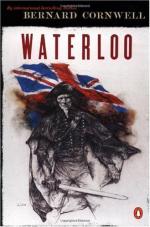
|
| Name: _________________________ | Period: ___________________ |
This test consists of 5 short answer questions, 10 short essay questions, and 1 (of 3) essay topics.
Short Answer Questions
1. What does Wellington order that his men keep?
2. What does Wellington order the Earl of Uxbridge to do?
3. What are many of the British redcoats doing as they wait?
4. What does Lord Rossendale say to the Life Guard officers?
5. What does Rossendale resolve to do the next day?
Short Essay Questions
1. What happens to the British Heavy Cavalry unit with which John Rossendale is riding?
2. What gross error in judgment and orders did the Prince of Orange make in Chapter 15?
3. Describe the area where the retreating British army takes up a position in Chapter 10.
4. In Chapter 10, what describes a critical decision made by Wellington that ultimately leads to an Allied victory?
5. What does Sharpe tell Rossendale during their encounter in the woods?
6. What is the difference between the disposition of the Allied Forces and the French in Chapter 13? For what does this afford the author an opportunity?
7. What is the difference between Napoleon and the Duke in how they come before their men and how their men acknowledge them?
8. What charge of heavy cavalry is described in Chapter 15 and what two roles do the horses have?
9. What new weapon is used, who invented it and why did the description of it stand out among other action scenes?
10. What explanations about British firing techniques are described in great detail in chapter 15?
Essay Topics
Write an essay for ONE of the following topics:
Essay Topic 1
Before the battle, civilians gathered to watch the fighting. Given war today, this seems a strange custom and dangerous. Nothing is written as to how the civilians of the losing army would be treated.
1. How often do you think "innocent" civilians are killed during a war or conflict?
2. Is it immoral to harm non-combatants during a conflict? What if those non-combatants support their government's policies about the war/conflict?
3. In WWII, the US government targeted two cities in Japan with atomic bombs. The targets were not military targets and the intent was to kill as many people as possible, no matter their age, sex, or status. Is this an acceptable way to end a war?
Essay Topic 2
Most protagonists are a mixture of admirable traits and character flaws, and Richard Sharpe is no exception. Sharpe's legendary powers of military strategy are juxtaposed with his reputation as a womanizer and his hatred for his wife. Discuss the following:
1. Trace and analyze situations when Sharpe demonstrates his prodigious powers of military strategy. Give specific examples to illustrate your analysis.
2. Trace and analyze Sharpe's character flaws offering specific examples of these flaws in your discussion.
3. Discuss how you think Sharpe's admirable traits helped him obtain a high rank in the military despite his background as a child. Have his flaws impacted his career at all? Do any of those under his command seem to notice these flaws? Who? How does the reader know this?
Essay Topic 3
The military way of life is in and of itself similar to a distinct culture. Understanding how the military is organized, how it operates, and its basic rules of conduct will make any novel that centers on the military more understandable and enjoyable. Discuss one of the following:
1. Describe and analyze the military structure during the time of Sharpe's Waterloo. What is rank? What is the difference between officers and enlisted men? How serious is it to disobey an order? What happens if one decides he does not like being in the military and walks away? How are men conscripted? Does the infantry have a similar means of augmenting their ranks as the maritime action called "impressment"?
2. Compare the infantry of Sharpe's Waterloo to that of modern times in the United States, England or France. What are the similarities? The differences? Are the changes from those times improvements? Why or why not? (This question will require some research).
3. Discuss why you think the military has the following: uniforms, a rank structure of officers and enlisted, strict discipline, training for new recruits, court martial, and different types of companies (i.e., rifle, cavalry, artillery, etc). Discuss why you think men (and nowadays women) choose to become professional soldiers.
|
This section contains 1,234 words (approx. 5 pages at 300 words per page) |

|




